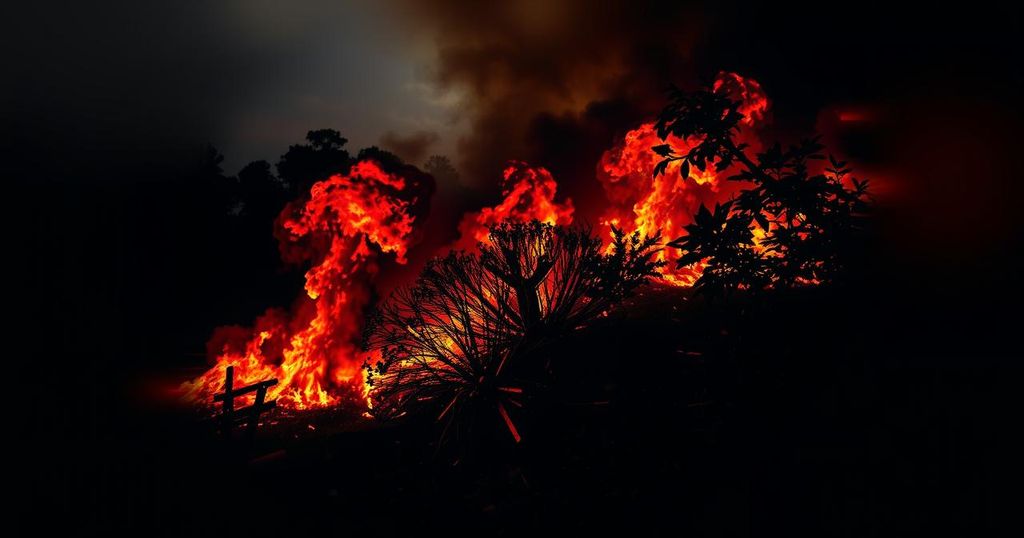Mozambique’s post-election violence following the disputed election on October 9 has led to significant unrest and humanitarian crises. Protests intensified after allegations of electoral fraud, resulting in at least 20 fatalities and hundreds injured. SADC leaders are convening to address this turmoil, which poses threats to regional stability and humanitarian well-being, exacerbated by drought-related challenges. Activists demand respect for civil liberties amidst a backdrop of corruption and mismanagement.
The recent post-election turmoil in Mozambique has escalated into severe violence and discontent following the controversial electoral results announced on October 9. Accusations of police brutality have surfaced, reportedly resulting in the deaths of at least 20 individuals and hundreds more injured during widespread demonstrations. The unrest was exacerbated when Daniel Chapo, the presidential candidate from the ruling Front for the Liberation of Mozambique (Frelimo), was declared the victor, leading to allegations of electoral fraud and further protests. On October 19, the assassination of two opposition leaders in central Maputo intensified the climate of chaos, prompting an escalation in protests that security forces have struggled to control. Opposition presidential candidate Venancio Mondlane fled the country due to threats against his life, symbolizing the dangers faced by dissenters in the current political landscape. The Southern African Development Community (SADC) is now addressing the crisis, with an extraordinary summit planned in Zimbabwe later in November. Human rights organizations characterize the situation as a humanitarian emergency, citing significant casualties and repression of peaceful protests. Reports indicate police violence in regions like Nampula and Niassa has reached alarming levels, prompting calls for intervention from both regional and international entities. South Africa has also felt the impact, having temporarily closed its primary port operations with Mozambique. This shutdown jeopardizes vital supply lines for several landlocked nations reliant on Mozambican ports for transportation of goods. Adding to Mozambique’s challenges is an ongoing drought affecting millions across the southern African region, which complicates the political turmoil. The combination of civil unrest, government repression, exacerbated humanitarian crises, and economic instability has put immense pressure on SADC leaders to respond decisively. The community’s credibility is at stake as it faces criticism for its previous endorsement of flawed electoral processes in member countries. Activists have expressed urgency for Mozambique to halt the repression of protests, restore internet access, and ensure the protection of civil liberties. There are growing concerns that the governmental crackdown and disruption of communication interfere with citizens’ rights to free expression and assembly. Moreover, the legacy of corruption and mismanagement in governance continues to fuel public outrage, particularly among Mozambique’s youth, who are demanding systemic change and social justice. In conclusion, the escalating situation in Mozambique, marked by post-election violence and civil unrest, not only threatens the stability of the nation but also poses significant repercussions for regional security within southern Africa. The response of SADC will be critical as it navigates this complex crisis, aiming to restore order and address the pressing humanitarian concerns while advocating for democracy and human rights in Mozambique.
Mozambique has a long and troubled history of political instability characterized by contested elections and civil conflict. Following independence from Portugal in 1975, the country has witnessed numerous challenges, including economic difficulties, insurgencies, and governance issues. The recent elections were marred by allegations of electoral fraud and subsequent violence, showcasing the fragility of its democratic processes. The humanitarian crises exacerbated by drought and internal strife further complicate the situation, impacting the broader southern African region, which relies on Mozambique’s ports for essential trade and resources. The SADC’s role in managing these crises is critical, as regional leaders face increasing pressure to intervene and promote stability in Mozambique and beyond.
The post-election violence in Mozambique highlights significant challenges faced by the nation and the southern African region as a whole. The humanitarian crisis stemming from police brutality and civil unrest, compounded by a severe drought, has prompted urgent calls for intervention from both SADC and the international community. It remains essential for regional leaders to address the root causes of the unrest while ensuring the protection of human rights and the restoration of democracy. The future stability of Mozambique is not only vital for its citizens but also crucial for the economic and political health of southern Africa.
Original Source: www.theeastafrican.co.ke






